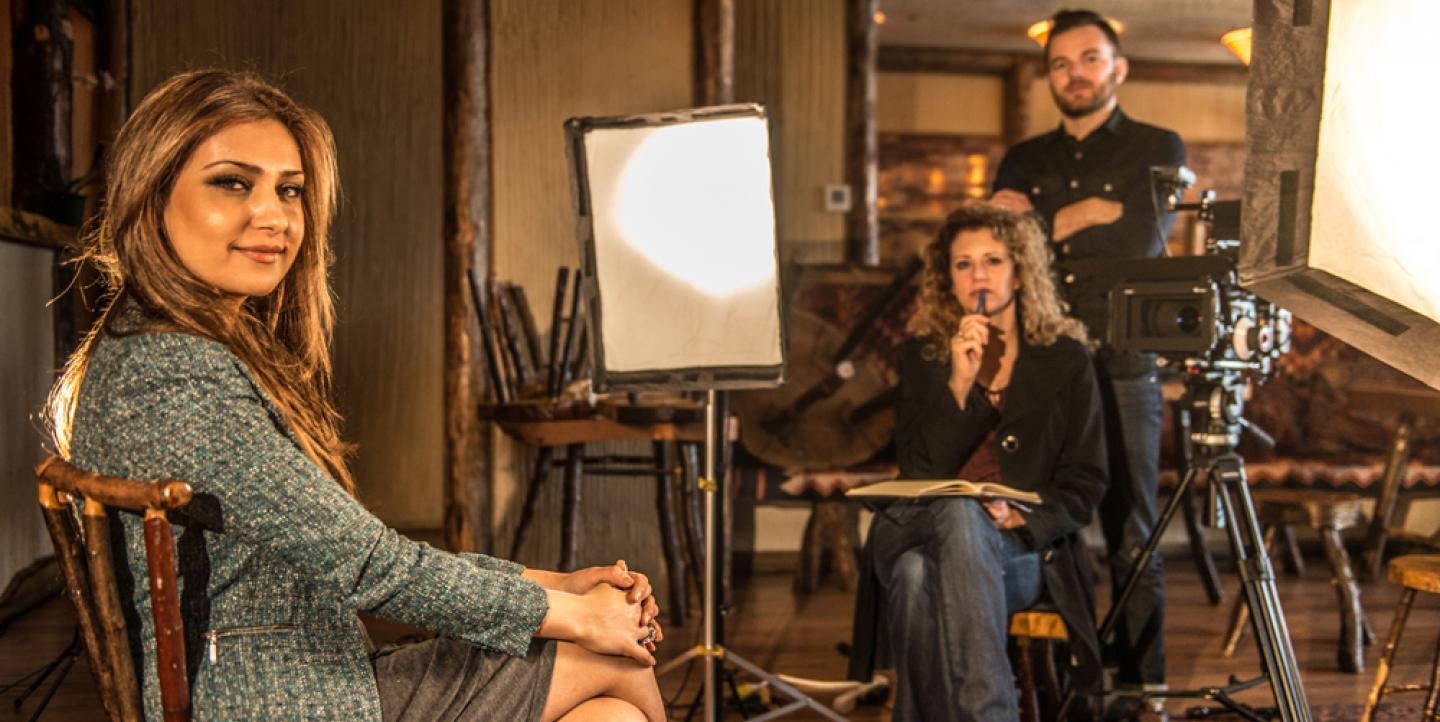At first glance, the music video for "Boro" seems unlikely to inspire much outrage. The song is light, English-language pop with shades of Shakira and Madonna performed by a young woman clad in summer clothes dancing with a shirtless Justin Trudeau look-alike at Vancouver’s Spanish Banks.
By North American standards, it’s an innocuous scene, but such imagery is still considered revolutionary in Afghanistan, where the Vancouver-based singer, Mozhdah Jamalzadah, has blazed a trail for freedom of expression and gender equality.
Born in Kabul but raised in Vancouver, 31-year-old Mozhdah—a first-name-only household figure in Afghanistan—has taken big risks to advance rights of women in her homeland, which remains conservative and patriarchal despite the 2001 fall of the Taliban. And it’s her journey to stardom while dealing with death threats, travelling in armoured vehicles, and narrowly avoiding a suicide bombing, that makes her a compelling central figure in the new documentary "Mightier than the Sword."
The powerful debut by Vancouver filmmaker Roberta Staley examines the impact of female media personalities in Afghanistan’s fight for gender equality. Staley, an award-winning editor and longtime contributor to Vancouver Magazine, created the new 48-minute film to complete her master’s degree in graduate liberal studies at SFU. After spending three weeks in 2012 in the Central Asian nation on assignment for Elle, she returned there in 2015 to shoot "Mightier Than the Sword" in 35 degrees Celsius weather during Ramadan. Staley remortgaged her condo to finish the film, which cost her more than CDN$80,000. “That’s what you do when you believe in something,” she says. “I was obsessed with telling this story about the media and how it was changing gender perceptions and gender equality.”
The film spotlights Mozhdah among a cast of Kabul-based characters that includes activist filmmaker Sahar Fetrat and TV reporter Shakila Ibrahimkhail. “What I admire most about her is how relentless she is about her belief in women’s rights,” says Staley. “She’s a beautiful singer, but she’s also kind and genuine. She’s a flagbearer for women in Afghanistan.”
That reputation was forged when Mozhdah, who studied broadcast journalism at BCIT and philosophy at UBC, went back to Afghanistan eight years ago and found fame hosting a groundbreaking, Oprah-esque talk show on 1TV, a Kabul-based channel. The show became a vehicle for challenging the repressive gender norms while bringing to light controversial topics like child abuse, domestic violence, and self-immolation among Afghan brides. Circa 2010 and 2011, The Mozhdah Show dramatically expanded her platform and advocated for women’s rights at a time when a Thomson Reuters Foundation survey ranked Afghanistan—home to some 15 million women—the world’s most dangerous country for females.
“It was a huge thing,” the singer recalls during an interview at the Vancouver Central Library’s atrium. “People hated me and people loved me. There were people cheering for me and people who were like, ‘You’re a disgrace! You’re in front of the camera. You should be in the kitchen cooking.’”
But little by little, her media presence helped inspire change. “In 2009, when I went to do my show, I had to cover my head,” Mozhdah says. “It was mandatory. If I didn’t wear it, they didn’t air it. By 2012, though, none of the Afghan female celebrities were forced to wear a head scarf.”
On International Women’s Day in 2010, she was invited to perform her Farsi hit “Dokhtare Afghan” (“Afghan Girl”) at the White House in front of Barack and Michelle Obama. And, as "Mightier Than the Sword" shows, even after death threats forced her to return to Vancouver in 2012, Mozhdah’s activism continued with the haunting 2015 ballad “Tribute to Farkhunda,” which commemorates a 27-year-old woman who was murdered by a Kabul mob after being falsely accused of burning a Koran.
“I remember I was crying for a week,” says Mozhdah. “I couldn’t believe that something so evil could happen right here on earth in 2015. What she must have gone through, I kept feeling it every second.”
While it would be easy for Mozhdah to hide out at home in Vancouver with her cats, Lucky and Simba, she says she’s resolved to keep agitating for change through her art, which draws from an array of influences ranging from Afghan legend Ahmad Zahir to Jann Arden. These days, Mozhdah occupies a strange space between superstardom in Afghanistan and regular personhood in Vancouver. During our interview, that gap is bridged when the Afghan proprietor of a nearby coffee shop spots her, brings over complimentary pastries, and says he’d love to have her sing at a family wedding.
By keeping a presence on the world stage—she still tours internationally and makes multilingual recordings for her new record label, Ethnobeast—Mozhdah is a critical figure challenging what Staley calls the “trope of guns and burkas” that defines Afghanistan for many Westerners. “You cannot ignore the media or denounce it,” the filmmaker says. “It is crucial to the growth, nurturing and continuance of democracy both in Afghanistan and here in the West.”
And even though Mozhdah’s feminist messaging still riles some of her conservative compatriots, she has found an effective way to push back through leveraging the power of her pop star status. “If I have messages in my inbox saying, ‘You’re not a good Muslim—you should do this or that,’ the next day I’ll post a picture of me maybe wearing a shorter skirt. Then my reply to them is, ‘You keep talking like this, and the next time, I’ll post a picture of me in a bikini.’ And it’s like, ‘OK, OK! I’ll stop.’”
This article first appeared in Vancouver Magazine and is republished on IJNet with permission. Image courtesy of Vancouver Magazine.
Lucas Aykroyd is an award-winning writer, newspaper columnist and public speaker based in Vancouver, British Columbia.

